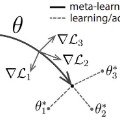Model-Agnostic Meta-Learning (MAML) has become increasingly popular for training models that can quickly adapt to new tasks via one or few stochastic gradient descent steps. However, the MAML objective is significantly more difficult to optimize compared to standard non-adaptive learning (NAL), and little is understood about how much MAML improves over NAL in terms of the fast adaptability of their solutions in various scenarios. We analytically address this issue in a linear regression setting consisting of a mixture of easy and hard tasks, where hardness is related to the rate that gradient descent converges on the task. Specifically, we prove that in order for MAML to achieve substantial gain over NAL, (i) there must be some discrepancy in hardness among the tasks, and (ii) the optimal solutions of the hard tasks must be closely packed with the center far from the center of the easy tasks optimal solutions. We also give numerical and analytical results suggesting that these insights apply to two-layer neural networks. Finally, we provide few-shot image classification experiments that support our insights for when MAML should be used and emphasize the importance of training MAML on hard tasks in practice.
翻译:模型-不可测元学习(MAML)在培训模式中越来越受欢迎,这些模式能够通过一种或几种随机梯度梯度下降步骤迅速适应新的任务,然而,与标准非适应性学习(NAL)相比,MAML目标更难优化,对于MAML在各种情景中解决办法的快速适应性方面比NAL改进多少,了解甚少。我们用由简单和艰苦任务混合组成的线性回归环境来分析这一问题,其中难度与梯度下降在任务上的趋同速度有关。具体地说,我们证明,为了让MAML在NAL上取得重大收益,MAML的目标必须比标准的非适应性学习(NAL)要大得多,(i)任务之间的难度必须存在一些差异,以及(ii)硬性任务的最佳解决方案必须与远离简单任务中心的最佳解决方案相近的地方紧密结合。我们还提供了数字和分析结果,表明这些洞察力适用于两层神经网络。最后,我们提供了几张图像分类实验,以支持我们在使用MAML时对硬性任务进行洞察时的洞察力,并强调培训的重要性。




